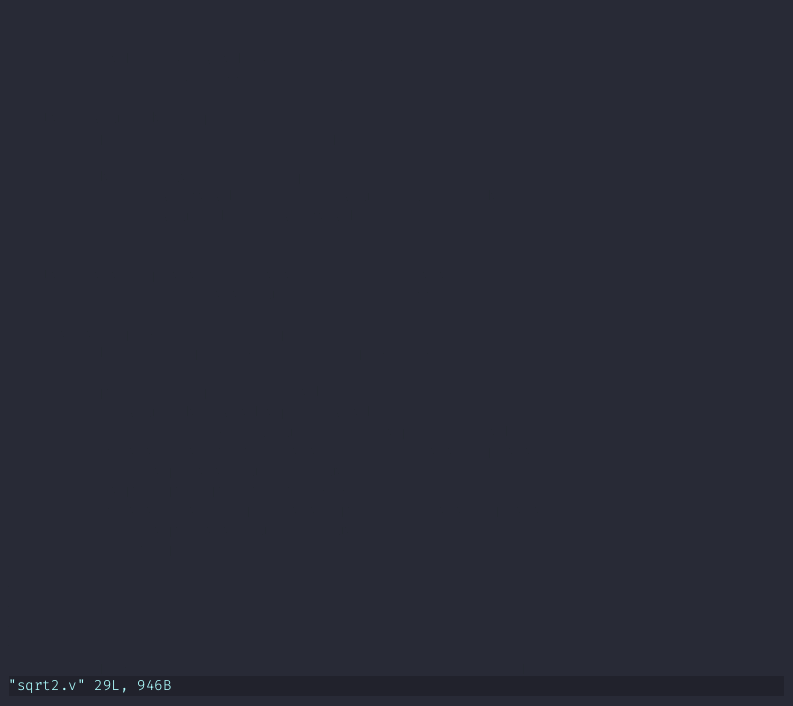Coqtail
A Vim/NeoVim plugin for interactive Coq proofs.
What/why?
Coq proofs are developed interactively. You write the property you want to prove and Coq tells you the current goal state, which includes hypotheses and variables that are in scope as well as any unproved conclusions. Then you tell it what the next proof step is, it updates the state, and you repeat until the proof is done.
If, like me, you are sufficiently indoctrinated into the Cult of Vim that you can't go more than a few lines in another editor without accidentally leaving is and :ws everywhere, then you need something to glue together Vim and Coq so they can talk. That's what Coqtail does.

How?
Coqtail broadly divides into three parts: a backend implemented in Python that handles communication with Coq, a Vimscript frontend that deals with stuff like buffers and windows and highlighting to make it look nice, and a mix of Vimscript and Python that plugs the two together.
The Backend
Coq provides a few ways of talking to it, but Coqtail uses the XML protocol. Whenever the user does something like ask to check some lines of a proof, check a variable's type, step back to a previous proof state, etc., Coqtail sends an XML message with the appropriate command to a Coq server, which is responsible for actually doing the verification and maintaining relevant state. The server also sometimes sends messages back, like when the goal changes, or if there was an error in the proof you asked it to check.
In order to support different versions of Coq, which sometimes support slightly different versions of the XML protocol, the actual XML serialization/deserialization is handled by an XMLInterface class. One level of abstraction above that, the Coqtop class manages some Coq-related state and actually talks to the Coq server by spawning processes, sending and receiving messages, etc.
The Frontend
In order to interact with the backend, Coqtail provides a bunch of commands and mappings. Some of these are common IDE operations ("jump to a definition"), but many are Coq specific ("advance the proof state by one sentence"). There's also some code to open additional windows to mimic to typical 3-panel layout that other Coq IDEs use: code, current goal, and messages. Finally, there's the syntax highlighting and indentation scripts, both of which are Unholy Masses of Edge-Cases and Best Efforts, but Mostly Work and are Doing Their Best to tame Coq's ridiculous grammar with regular expressions.
The Midend?
So how do you make your Vim talk to your Python? Answer: with a whole other client-server architecture and communication protocol. The CoqtailServer and CoqtailHandler classes listen for JSON, which Vim knows how to speak, and pass the messages along to the Coqtail class, which puts things in terms that the Coqtop class can understand. The Coqtail class also does a bunch bookkeeping for things like "what are the most recent contents of the buffer" (so we can tell when and how the file changed) and "what was the last line in the file that Coq checked" (so we know where to start when moving forward or backwards).
Through some magic and quite a bit of pain and suffering, this
separation between layers allows most of Coq's thinking to happen
asynchronously, so you can still move your cursor around or look
at other files while you evaluate Nat.pow 2 1000.
You can even sometimes interrupt it without totally confusing
either Coq or Coqtail about where it is.
All this and more should be much improved in...
The Future
coq-lsp is an experimental Coq server that uses the Language Server Protocol (LSP) instead of XML. It also uses a different Coq document manager, which, among other things, makes it easier and more efficient to check an entire file at once instead of line-by-line. What this means for Coqtail is that almost all of the current mid and backends can be thrown away in favor of using an existing LSP-capable Vim plugin. In principle, most of the frontend can stay the same and the only new code that's needed are some simple handlers for a few custom Coq-specific LSP commands.
I have implemented a promising proof of concept on the coq-lsp branch, but it needs more work before it's fully ready.